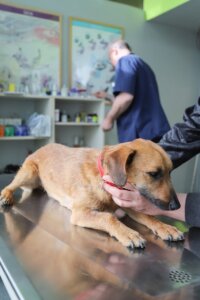Should I Worry About Bloody Dog Poop?

Uh-oh. When you stopped to pick up your dog’s poop on your evening walk, you noticed bloody dog poop. You’re likely concerned and worried about your fur-baby. Fortunately, this is not often a cause for major concern. However, there are enough concerning issues behind blood in stools that you should pay attention to your dog’s poop.
Since those of us at Super Scoopers spend a lot of time looking at dog poop, dog digestive health is a significant concern for us.
Understanding the Different Types of Bloody Dog Poop
The first thing to know is that there are primarily two different kinds of bloody dog poop. According to the American Kennel Club (AKC), “Hematochezia is bright red blood. This type of bleeding occurs in the lower digestive tract or colon and indicates a specific set of conditions.” Since the blood is bright red in color, it means it is fresh and was not digested. Often, hematochezia occurs from dogs straining when they poop and comes from the dog’s rectum or colon.
In contrast, AKC explains, “Melena is a dark, sticky, tarry stool, almost jelly-like. This blood has been digested or swallowed, indicating a problem in the upper digestive tract” such as the lungs, esophagus, stomach, or upper small intestine.
Additionally, melena is more subtle in appearance. According to Pet Helpful, “Usually, but not always, melena is more worrisome than an occasional case of hematochezia. Melena is often not readily recognizable as hematochezia because dogs may often have dark stools and that doesn’t necessarily mean they have blood in them.”
Then again, if you happen to notice bloody dog poop just one time, it may not be serious. For example, it could be a rectal injury that is the result of something hard your dog ate, such as a stick or sharp object. Or, it could be red in color from food dyes.
Possible Causes of Bloody Stool in Dogs
When we talk about bloody dog poop, it’s important to understand that this is the effect and not the cause. If you find blood in your dog’s stool, this is indicative of something else going on. It could be a minor rectal injury, an issue in the lower digestive tract, or a problem in the upper digestive tract. Here are causes from the Pet Health Network:
- An upset stomach from eating bad food
- Inflammation of the colon (colitis)
- Internal parasites (such as roundworms)
- A viral infection (like parvovirus)
- A bacterial infection
- An intestinal foreign body
- Cancer
- Allergies
- Autoimmune disorders (such as inflammatory bowel disease)
Again, melena is harder for pet parents to notice, but if it is discovered, this is worrisome. Melena can be indicative of a serious problem, such as internal bleeding, tumors, cancer, or blood clotting.
Call Your Vet If You See Blood in Dog Stool
Since there are many different causes for bloody dog poop, it is wise to schedule an appointment with your veterinarian. You don’t want to assume it is a minor rectal injury when there could be something serious going on internally. With that being said, you need to be prepared to talk to your vet about your dog’s stool. For example, the veterinarian will need to know the texture (solid or loose) and the color of the poop.
Your veterinarian will do a complete exam, including blood tests, to try to determine the possible cause. Additionally, for this health problem, the veterinarian will likely perform a fecal flotation. A fecal flotation will help determine if the cause of the bloody dog poop is the result of intestinal parasites, such as hookworms, whipworms, or giardia. Since this is a poop related problem, you should come to the appointment with a collected stool sample.
In other cases, your veterinarian may need x-rays or ultrasounds to see what is happening internally.
The Treatment Options
Without the technology available at a pet hospital, it is impossible for pet owners to know how to treat this issue. However, after your dog has been examined and the cause identified by a veterinarian, the right course of treatment can begin. With this being said, the treatment for bloody dog poop largely depends on the cause.
For example, if it appears to be caused by what your dog is eating, then your dog will be put on a special diet. If it seems to be caused by parasites, then medications to deworm your dog will be prescribed. In more serious cases, such as viral infections or foreign objects in the body, your dog may need hospitalization or surgery.
Check Your Yard and Collect a Stool Sample
At Super Scoopers, your dog’s digestive health matters to us. Our suggestion is to check your yard or other areas where you let your dog go to the bathroom to see if you notice anything worrisome.
While you are checking your yard, you should go ahead and collect a stool sample. Your veterinarian is going to request one (especially if you notice bloody dog poop), so it’s best to be prepared.
As you are checking your yard and collecting your sample, keep in mind that it doesn’t have to be this way. If your yard is littered with doggie doo, schedule a professional pooper scooper clean-up. Super Scoopers offers several residential scooping packages in Frisco, TX and surrounding areas.




